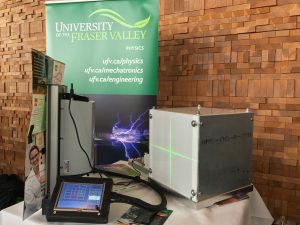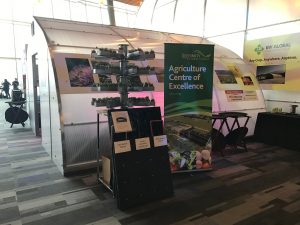A quality assurance test for radiation therapy designed by UFV students and a high-tech greenhouse will be shown at British Columbia’s tech conference this year. The displays are by UFV’s mechatronics program and the Agriculture Centre of Excellence. UFV will also have a general display.
The BC Tech summit is an annual two-day trade show for British Columbia-made tech innovations and industry-related networking. As B.C.’s biggest tech conference, it draws in technologies from medicine, robotics, aerospace, and other sectors. The show runs March 14 and 15 at the Vancouver Convention Centre.
‘Mechatronics QA test device’
The mechatronics project, Automating Mechanical Quality Assurance Tests for Medical Linear Accelerators, was last year’s graduating and the first UFV mechatronics’ graduating class’ final project.
Lin Long, associate professor and co-chair of the engineering and physics program oversaw and instructed the project, which was the capstone course project and took four months to complete.
The purpose of the device is to calibrate and align the radiation machines used in cancer radiation therapy so that they can deliver their beam directly at the tumor. Cameras within the device, which is only about the size of a microwave, process the aim of the linear accelerator and send feedback to remotely align the apparatus until it’s centred.
During radiation therapy, the beam from the linear accelerator will strike the tumor. It can be dangerous to irradiate the tumor’s surrounding healthy tissue so the machine must be precisely calibrated. Over time, the machine falls out of alignment and must be adjusted regularly to insure accuracy.

For their work on the quality assurance test device, Cameron Appeldoorn and Brandon Vangenderen, both students in the Mechatronics class were hired by the BC Cancer Agency to continue development on the quality assurance test device.
“So what we’d normally do for calibration is set up a measuring device and align it with the linear accelerator’s isocenter to then compare the lasers to that device,” said Appeldoorn. “So we’d take a reference point, compare the laser to the reference point, and visually check it.”
But this manual method could take upwards around 30 or 40 minutes if all four lasers need to be adjusted.
“What our device does is instead of having to visually check it, we take an image of a projection of that laser, then compare that to an image of the actual laser so we can subdivide the offset a little bit better with a camera’s vision rather than a human vision,” Appeldoorn said.
Essentially, instead of measuring the aim of the machine manually, the device that Appeldoorn and Vangenderen worked on sights the laser itself and automatically adjusts the machine accordingly. It does this in less than five minutes.
With the process’s speed increased, what was normally a monthly test can be done more frequently, once a week or daily if necessary. Time is a valuable resource with the linear accelerator because it is so heavily booked for treatments. With a faster quality assurance test, the machine can be used more frequently and more accurately.
“Time is probably the most significant factor, and then the accuracy,” said Vangenderen. “Using cameras, we can get the accuracy from around .5 millimeter to about .1 millimeter. We’re fairly consistent around .1 millimeter.”
The device is currently in its third generation, but designs for the fourth are ready. While the machine isn’t used for clinical purpose yet, Appeldoorn and Vangenderen hope to publish a paper on their on their findings of the precision and accuracy of the machine. They’re also hoping that the machine will be picked up for production for the medical market.
‘The BioPod’
The BioPod initiative is a partnership between the City of Surrey, the John Volken Academy, and the University of the Fraser Valley. The BioPod itself consists of two greenhouses connected together in a U-shape formation. One side is used for research and development while the other is used as a control.
These high-tech greenhouses are used for research, training, and the production of food used at the John Volken Academy, an addictions treatment and rehabilitation centre.

The BioPods feature innovative designs, for which they won an award last year.
In their current capacity, the BioPods have been used to test what is called a high diffusion poly covering the greenhouse. This material distributes sunlight multi-directionally and more evenly than a traditional greenhouse poly covering.
Within the greenhouses, B.C. tech company, Affinor Growers’ (also at the tech summit) tested their vertical growing system.
The vertical growing system is made up of a vertical post with four levels of troughs that hold plants. The tower is mechanically driven to rotate in order to distribute sunlight evenly over the plants. With this system, more plants can be grown per square foot than on level ground.
Both projects will be shown at the BC Tech Summit until March 15.


